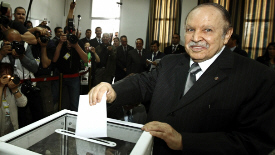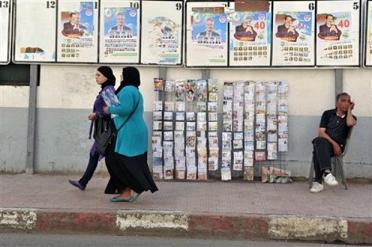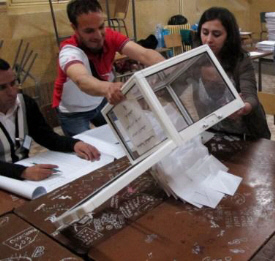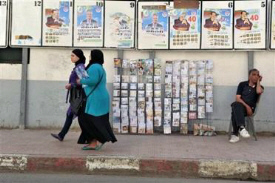Algeria’s former single party tightened its grip on power in an election that bucked the regional trend, according to results Friday that drew accusations of fraud from the defeated Islamists.
 Algeria's former single party tightened its grip on power in an election that bucked the regional trend, according to results Friday that drew accusations of fraud from the defeated Islamists.
Algeria's former single party tightened its grip on power in an election that bucked the regional trend, according to results Friday that drew accusations of fraud from the defeated Islamists.
President Abdelaziz Bouteflika's National Liberation Front (FLN) won 220 out of 462 seats up for grabs in Thursday's election, the first since the Arab Spring, improving on its share in the outgoing national assembly.
An alliance of moderate Islamist parties and the four other Islamist groups could only manage a combined 66 seats, a major setback after predicting victory during the campaign.
The National Rally for Democracy (RND) of Prime Minister Ahmed Ouyahia, a nationalist party close to the military and loyal to Bouteflika, was second with 68 seats, compared to 62 in the outgoing house.
Algeria's governing coalition so far included the FLN, the RND and the largest of the legal Islamist parties, the Movement of Society for Peace.
 Friday's provisional results, which have yet to be confirmed by the constitutional council, mean the FLN and the RND could form a majority without the Islamists.
Friday's provisional results, which have yet to be confirmed by the constitutional council, mean the FLN and the RND could form a majority without the Islamists.
The main Islamist alliance, Green Algeria, garnered a paltry 48 seats and charged widespread fraud.
In the wake of the Arab Awakening, moderate Islamist parties recorded electoral victories in Tunisia, Egypt and Morocco.
But Interior Minister Daho Ould Kablia announced a "remarkable" rate of 42.36 percent which he said confirmed Algeria's democratic credentials.
Pro-government newspapers said voters had expressed confidence in the political system by taking part in the election, which comes after a reform package initiated in the wake of the Arab Spring.
"If there's a winner on this Algerian spring day, it's undoubtedly the people," El Moudjahid wrote in a front-page editorial.
 "In their millions, Algerians projected a good image of democracy, proving to the world that they are not disconnected from political life."
"In their millions, Algerians projected a good image of democracy, proving to the world that they are not disconnected from political life."
Many Algerians and observers had predicted that ever deeper mistrust, especially among the country's majority of young people, could lead to an even worse turnout than the historical low of 35 percent recorded in 2007.
The opposition Rally for Culture and Democracy, which has 19 MPs in the outgoing assembly but chose to boycott this election, claimed the announced turnout was fraudulent.
"The turnout as recorded by the local commissions, infiltrated by the administration though they may be, did not exceed 18 percent," the party's chairman said at a press conference.
Some 500 foreign observers brought in by Bouteflika to monitor the vote reported only minor hiccups but they were denied access to the electoral roll before the vote.
The majority of the 41 other lists in the electoral fray were small and unknown groups that critics argue the regime authorized to create an illusion of democratic choice.
Bouteflika was a minister in Algeria's first independent government in 1962 and, at 75, he is keen to burnish his legacy with large-scale projects such as the world's third largest mosque.
Analysts say the legislative election was acting as a kind of primary for the 2014 presidential poll, which Bouteflika is not expected to contest.
